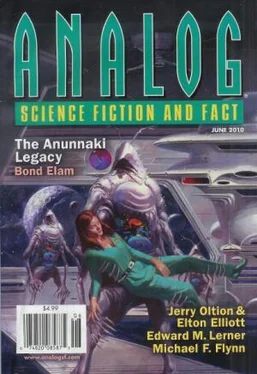Bond Elam - The Anunnaki Legacy
Здесь есть возможность читать онлайн «Bond Elam - The Anunnaki Legacy» весь текст электронной книги совершенно бесплатно (целиком полную версию без сокращений). В некоторых случаях можно слушать аудио, скачать через торрент в формате fb2 и присутствует краткое содержание. Год выпуска: 2010, Издательство: Dell Magazines, Жанр: Фантастика и фэнтези, на английском языке. Описание произведения, (предисловие) а так же отзывы посетителей доступны на портале библиотеки ЛибКат.
- Название:The Anunnaki Legacy
- Автор:
- Издательство:Dell Magazines
- Жанр:
- Год:2010
- ISBN:нет данных
- Рейтинг книги:3 / 5. Голосов: 1
-
Избранное:Добавить в избранное
- Отзывы:
-
Ваша оценка:
- 60
- 1
- 2
- 3
- 4
- 5
The Anunnaki Legacy: краткое содержание, описание и аннотация
Предлагаем к чтению аннотацию, описание, краткое содержание или предисловие (зависит от того, что написал сам автор книги «The Anunnaki Legacy»). Если вы не нашли необходимую информацию о книге — напишите в комментариях, мы постараемся отыскать её.
The Anunnaki Legacy — читать онлайн бесплатно полную книгу (весь текст) целиком
Ниже представлен текст книги, разбитый по страницам. Система сохранения места последней прочитанной страницы, позволяет с удобством читать онлайн бесплатно книгу «The Anunnaki Legacy», без необходимости каждый раз заново искать на чём Вы остановились. Поставьте закладку, и сможете в любой момент перейти на страницу, на которой закончили чтение.
Интервал:
Закладка:
“They’re at maximum acceleration,” Cantrell said. He paced behind Lassiter, little more than a shadow on the snow filled monitor. “This is costing us an arm and a leg.” He stopped, his face coming into focus as he leaned toward them. “But money’s no object, okay? We’ll spend whatever it takes.”
“How long?” Tobias repeated.
The superintendent straightened, shoving his hands into the pocket of his tunic. “Seventy-three hours.”
Tobias glanced down at his own mission assistant, then up at Cantrell. “Perfect,” he said. “You’re only going to miss by three days.”
“I don’t know what to say,” Advocate Lassiter shouted. “We never planned on any of this.”
“That’s the problem,” Tobias said as he reached out to break the connection. “You never planned on anything.”
“I don’t think Lassiter and Cantrell did this on purpose,” Liz said. “I mean, I don’t think they really intended to kill us.”
Tobias shrugged. “Probably not,” he conceded as he paced the floor behind her. “Unfortunately, that doesn’t do us a lot of—” He broke off, pausing to peer down at the monitor for the gene analyzer.
“What?” Liz said, rising to join him. “What are you looking at?”
Tobias’ features were partially obscured by the cascade of numbers reflected off his faceplate, but there was no mistaking the intensity of his concentration. His whole body was locked forward, his eyes fixed on the screen.
“That’s not right…” he said. “That shouldn’t be…”
“What’s not right?” she asked.
“The DNA analysis,” he murmured. “I’ve never seen anything like it. The introns are all wrong.”
“Introns?” she said.
“The genetic code between our genes,” he explained. “Like I was telling you earlier, those long double helixes that make up our chromosomes aren’t just genes—not when they evolved naturally. In fact, long stretches of the helixes contain no genes at all. Some of the in-between code turns genes on and off, but a lot of it’s just junk. It no longer serves any purpose, or it may never have served any purpose. It’s nothing but meaningless nucleotide sequences that repeat themselves from one generation to the next in response to the laws of chemistry. It has no higher purpose at all.”
“My field’s archaeology, remember?” Liz said. “I understand how DNA works in principle, but the specifics…” She spread her hands in surrender.
“What’s important is that the nonfunctional part of the code—the part that serves no apparent purpose—replicates itself from one generation to the next, just like the functional part does. That means that the introns from two different members of the same species should look pretty much the same. Yours and my introns, for example, will be at least as similar as our functional code. But the worms’ nonfunctional introns are different from one specimen to the next. Very different. Pick any one worm, and its introns will be entirely different from the next one you pick. Well, usually they’ll be different. In a couple of instances they’re the same. Which makes the whole situation even more confusing.”
“I don’t understand,” she said.
“Neither do I,” he said. He scrunched his mouth to one side, thinking. “Their functional genes are almost identical—like yours and mine, but the introns…” He shook his head. “It probably has something to do with the genetic reengineering we were talking about. But how, I don’t know. All I can really determine is that the worms’ older hydrogen-sulfide genes were turned off and the new oxygen-breathing genes were turned on.”
“So they don’t like hydrogen sulfide any better than we do?”
“They tolerate it better than we do, but I think they need more oxygen than they’re getting out here in the open. Which probably explains why they spend most of their time under the ice where the algae generate most of their oxygen. That would also keep them away from the vents and fissures that put out most of the hydrogen sulfide.”
Liz looked down at the remaining specimens in the stainless-steel tray. “So these worms would ultimately have died.”
“Unless they could have tunneled their way back under the ice sheet. The crust is filled with tunnels, old lava tubes and cracks in the basalt. That’s what makes it so brittle. My guess is that the worms tunnel around a lot.”
“So you think they would have tunneled back under the ice?”
“Some of them might have. But they’re just worms. Engineered worms, maybe. But still just worms. They, uh—” His voice suddenly halted.
“They, uh—what?” she asked.
He stared at her, blinked, then abruptly turned toward the cabinets at the rear of the igloo. “Food packs,” he said. “We’re going to need extra food packs.”
“What are you talking about?”
He grabbed her arm, dragging her toward the cabinets. “We have to go,” he said. “We’ve have to get out of here.”
“But where?” she asked. “Where are we going?”
“Where the worms go,” he said. His eyes were bright with excitement as he pulled food packs out of the cabinets. “We’re going to tunnel under the ice. We’re going to follow the worms back to the source of their oxygen.”
Liz and Tobias spent nearly an hour exploring the small streams that flowed out from under the ice sheet before they found an ice cave large enough to crawl into. They waded back nearly a quarter mile, crawling through several submerged sections of tunnel, before they reached a large cavern. The cavern surrounded a pool of cold, clear water that had formed in a depression where the ice had gouged out the underlying rock.
“This is as far as we go,” Tobias said. He turned slowly, shining his shoulder lights around the interior of the cavern. The concave ceiling gleamed like translucent green glass, as smooth as if it had been polished. Water seeped out from under the ice on the far side of the cavern, but there was no opening through which they could continue.
“So, what happens now?” Liz asked.
Tobias shrugged, thought for a moment, then abruptly snapped open his faceplate and sucked in a deep breath.
“Wait!” she cried. “We need to check the hydrogen sulfide levels.” She peered down at her mission assistant.
Tobias held his breath for a few seconds, then exhaled with a relieved smile. “I don’t think it makes much difference at this point. We’re almost out of oxygen as it is.” He sucked in another long breath, this time through his nose, sniffing as he inhaled.
“Can you smell it?” Liz asked.
He nodded. “Rotten eggs.” He took a couple more quick sniffs. “But not too bad.”
“Is that a scientific assessment?”
“The nose knows,” he said, tapping the side of his nose. He glanced down at his own mission assistant. “Forty parts per million. Not exactly what you’d like, but we can survive.”
Unfortunately, Liz’s sense of relief quickly dissipated when she discovered that she couldn’t raise the Arrow on her mission assistant.
“There’s too much interference,” she said. “My assistant doesn’t have enough power to reach the ship.”
“Give it some time,” Tobias said. “These ion storms never last.”
“But what if it does?” she asked. “What if they decide we’re dead?”
“Regardless, they’ll come looking for our bodies,” Tobias said. “We’ll reach them once they’re on the surface.”
“But what if they don’t?” she said. “What if they just write us off.”
Tobias’s brow tightened as he considered the possibility. He thought for a moment, then gave his head a sudden shake. “No,” he said, dismissing the idea. “Not even Cantrell would do something like that.”
Читать дальшеИнтервал:
Закладка:
Похожие книги на «The Anunnaki Legacy»
Представляем Вашему вниманию похожие книги на «The Anunnaki Legacy» списком для выбора. Мы отобрали схожую по названию и смыслу литературу в надежде предоставить читателям больше вариантов отыскать новые, интересные, ещё непрочитанные произведения.
Обсуждение, отзывы о книге «The Anunnaki Legacy» и просто собственные мнения читателей. Оставьте ваши комментарии, напишите, что Вы думаете о произведении, его смысле или главных героях. Укажите что конкретно понравилось, а что нет, и почему Вы так считаете.












